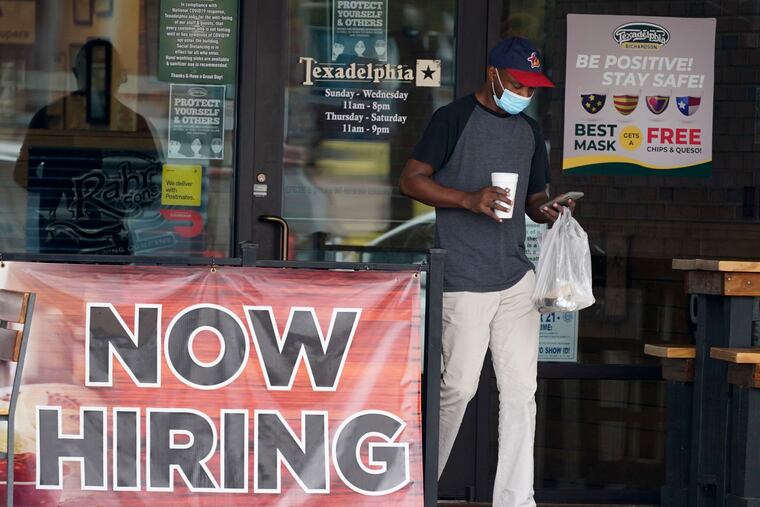U.S. jobs rose less than forecast in September as economic rebound downshifted
The report, the last before November's presidential election, reflects a sizable decline in local education jobs, while gains in retail and temporary workers slowed.

U.S. job gains slowed in September and many Americans quit looking for work, suggesting the economic recovery is downshifting as the country struggles without a Covid-19 vaccine or fresh government aid.
Nonfarm payrolls increased by 661,000 following an upwardly revised 1.49 million advance in August, according to data Friday from the Labor Department. That compared with the median estimate of economists for a gain of 859,000. The unemployment rate fell by more than forecast, dropping 0.5 percentage point to 7.9%, though the labor-force participation rate declined by 0.3 point to 61.4%, with declines particularly pronounced among women.
The report, the last before November's presidential election, reflects a sizable decline in local education jobs, while gains in retail and temporary workers slowed. What's more, persistently high jobless claims, along with this week's announcements of tens of thousands of layoffs, also indicate widespread economic pain.
Lawmakers remain at odds over further stimulus to help jobless Americans and small businesses, though the latest numbers could add pressure to agree on a package.
With just a month left before the November election, the jobs data are being closely watched, though the contest was scrambled earlier Friday by news of President Donald Trump's positive test for the coronavirus. The relatively strong rebound in jobs in prior months has been a talking point for Trump, who before the pandemic presided over the lowest unemployment rate in decades.
U.S. stock futures extended losses following the jobs report, while 10-year Treasuries and the dollar were higher.
One of the key drivers of September's payrolls figure was a 280,500 seasonally-adjusted drop in employment in state and local education, as budget cuts along with a switch to virtual education in many districts weighed on hiring. On an unadjusted basis, that figure actually rose, though by much less than typical for the start of the school year.
Failure to pass an additional stimulus could also spur further cuts in state and local government jobs.
Federal government employment fell by 34,000 in September, reflecting a drop in temporary Census workers in the month, after hiring of such employees gave a 238,000 boost in August.
The number of Americans who were classified as long-term unemployed jumped by 781,000 last month to 2.4 million. The category, which includes those actively searching for work for 27 weeks or more, underscores the lasting economic scars many Americans will have after months of joblessness.
In another sign that economic troubles are likely to persist, the number of permanent job losers rose by 345,000 to 3.8 million, a seven-year high, while the number of Americans on temporary layoff fell by 1.5 million to 4.6 million.
The labor participation rate for so-called prime-age women, between ages 25 and 54, fell for a third straight month, by 0.7 percentage point, compared with a 0.4-point drop among men. That figure -- which reflects those employed, plus the jobless who are actively looking for work, as a share of the population -- signals parents are increasingly leaving their jobs due to childcare obligations, with many students forced to learn virtually at home instead of in person.
Private payrolls rose by 877,000, which was in line with forecasts but still marked a slowdown from the prior month. Leisure and hospitality, which has suffered some of the biggest job losses, was the largest gainer among major sectors, adding 318,000 jobs -- though total payrolls remain almost 4 million below pre-pandemic levels.
Industries including oil, entertainment and financial services are all home to major companies announcing job cuts in recent days, which will take some time to show up in official data. Walt Disney Co. said Tuesday it's slashing 28,000 workers in its slumping U.S. resort business, while Royal Dutch Shell Plc will cut as many as 9,000 jobs as crude's crash forces billions of dollars in cost savings and Allstate Corp. will shed 3,800 workers.
Aerospace manufacturer Raytheon Technologies Corp. also announced job cuts in September, while airlines began laying off tens of thousands of employees on Thursday after federal payroll aid wasn't renewed. Negotiations between Republicans and Democrats on a new federal stimulus package resumed this week, but talks remain on life support after the House passed a Democrat-only $2.2 trillion package.
- - -
Bloomberg’s Chris Middleton, Sophie Caronello and Vince Golle contributed to this report.